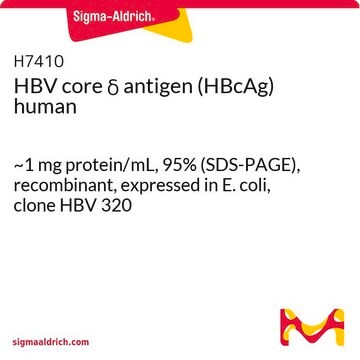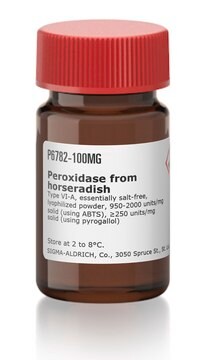H8909
HBcAg core human
~1 mg/mL, ≥95% (SDS-PAGE), recombinant, expressed in E. coli
Synonym(s):
Hepatitis B virus core antigen
Sign Into View Organizational & Contract Pricing
All Photos(1)
About This Item
Recommended Products
recombinant
expressed in E. coli
Quality Level
Assay
≥95% (SDS-PAGE)
mol wt
18 kDa
concentration
~1 mg/mL
UniProt accession no.
storage temp.
−20°C
Gene Information
hepatitis B virus ... HBVgp4(944568)
human ... HBVgp4(944568)
General description
amino acids 1-183 of HBV core antigen.
Biochem/physiol Actions
HBcAg core human is a capsid protein of hepatitis B virus (HBV). It acts as a viral factor for HBV clearance. HBcAg is implicated in viral replication.
Hepatitis B virus core antigen (HBcAg) is a positive control for human HBV antibodies.In humans with chronic HBV (hepatitis B virus) infection, cytotoxic effects of blood T lymphocytes can be suppressed by incubating cells with antibodies against hepatitis B core antigen (HBcAg). The antigen can also work as a T-cell independent antigen in athymic mice. However, it is an efficient immunogen, resulting in T-cell activation and increased anti-HBc levels. High cytoplasmic/membranous expression of HBcAg is associated with increased liver inflammation.
Physical form
Solution in 50% glycerol, 7.5 mM phosphate buffer, pH 7.2, 75 mM NaCl.
Storage Class Code
10 - Combustible liquids
WGK
WGK 1
Flash Point(F)
Not applicable
Flash Point(C)
Not applicable
Certificates of Analysis (COA)
Search for Certificates of Analysis (COA) by entering the products Lot/Batch Number. Lot and Batch Numbers can be found on a product’s label following the words ‘Lot’ or ‘Batch’.
Already Own This Product?
Find documentation for the products that you have recently purchased in the Document Library.
J B Kurtz et al.
Journal of virological methods, 96(2), 127-132 (2001-07-11)
A measurable serological response to hepatitis C infection is delayed on average until 70 days after infection. In addition, it may not occur in some immunocompromised people. Detection of free hepatitis C (HCV) core antigen in blood has enabled diagnosis
Long Liu et al.
Journal of medical virology (2020-02-23)
Hepatitis B virus (HBV) chronically infects approximately 350 million people worldwide, and 600 000 deaths are caused by HBV-related hepatic failure. Golgi protein 73 (GP73) is a serum biomarker for liver diseases, including chronic hepatitis B. Here, we determine the effect
D R Milich et al.
Journal of immunology (Baltimore, Md. : 1950), 139(4), 1223-1231 (1987-08-15)
Hepatitis B virus nucleocapsid particles (HBcAg) can function as a T cell-independent antigen when injected into athymic mice. However, immunization of euthymic mice with HBcAg results in dramatically increased anti-HBc titers. Therefore we have examined the murine T cell response
Jun Hong et al.
Hepatology research : the official journal of the Japan Society of Hepatology, 38(4), 362-373 (2007-11-21)
This study was undertaken to investigate whether plasmacytoid dendritic cells (PDC) are involved in the generation of a higher proportion of CD4(+) and CD25(+) regulatory T (Treg) cells in chronic hepatitis B virus (HBV) infection compared with healthy patients. The
Hepatitis B virus nucleocapsid but not free core antigen controls viral clearance in mice
Lin YJ, et al.
Journal of Virology, 86(17), 9266-9273 (2012)
Our team of scientists has experience in all areas of research including Life Science, Material Science, Chemical Synthesis, Chromatography, Analytical and many others.
Contact Technical Service




